To mark the 28th anniversary of President René Moawad’s assassination, a commemoration mass was held at the St. John the Baptist Cathedral in Zgharta, under the auspices of President Michel Aoun. President Moawad’s family and the families of his fellow martyr-companions had called for the celebration, which this year was under the slogan ‘The Martyr of Lebanon’s free decision’.
President Aoun was represented by Minister of State for Presidency Affairs Pierre Raffoul, Speaker Nabih Berri by MP Estephan Doueihy, and Prime Minister Saad Hariri by Minister of Labor Mohammad Kabbara. Former President Michel Suleiman was represented by former minister Alice Shabtini, and former President Amine Gemayel by his wife Mrs Joyce Gemayel. Former President of the Assembly Hussein El Husseini was also present, along with former minister Nicolas Nahhas representing former Prime Minister Najib Mikati, and Archbishop of Becharre and Zgharta-Ehden Mgr Joseph Naffah, representing Patriarch Mar Bechara Boutros Al-Rahi. Mgr Naffah led the mass, assisted by Bishop Emile Saadeh, Bishop Georges Abu Jaoudé the head of the Maronite Parish in Tripoli, and Bishop Georges Assadorian, representing Armenian Catholic Patriarch Gregorios Petros XX. Was also present the Vatican Chargé d’Affaire in Lebanon, Archbishop Yvan Santos.
Former minister Nicolas Sahnaoui represented the head of the ‘Free Patriotic Movement’, Gebran Bassil; MP Henri Helou represented the head of the ‘Democratic Gathering’ parliamentary bloc, Walid Joumblatt; MP Fady Karam represented the head of the ‘Lebanese Forces’ party Samir Geagea; former minister Alain Hakim represented the head of the ‘Kataeb’ party Sami Gemayel; former minister Youssef Saadeh represented the head of the ‘Al Marada’ movement, MP Suleiman Frangieh; Ziad Dib represented the general secretary of the ‘Future Movement’ Ahmad Hariri; and Hatche Harmandian represented the general secretary of the ‘Tachnag’ party.
Also present: Judge Antoine Lattouf representing the Minister of Justice Salim Jreissaty; Nakhle Rachou representing the Minister of State for Fighting Corruption Nicolas Tuéni; general director Ahmad Hammoud representing the Minister for the Displaced Talal Arslan; former minister General Achraf Rifi; former minister Mohamad Youssef Baydoun; Ahmad Safadi representing former MP Muhamad Safadi; Mrs Loubna Obeid representing her husband former minister Jean Obeid; former minister Faisal Karameh; MPs Ahmad Fatfat, Nidal Tohmé, Khoder Habib, Kazem El Kheir, Kassem Abdelazziz, Antoun Saad, Anwar El Khalil, and MP Boutros Harb represented by his son Majed Harb, as well as former MP Jawad Boulos.
The Commander-in-Chief of the Army, General Joseph Aoun, was represented by General Yacoub Moawad; the Interior Security Forces general-director, General Imad Osman, was represented by General Tony Al Zakra; the General Security Forces general-director, General Abbas Ibrahim, was represented by the head of the General Security directory in North Lebanon, General Raymond Ayoub; the State Security general-director, General Toni Saliba, was represented by Major Iskandar Younis; the Customs general-director, Badri Daher, was represented by General Claude Awad; the Civil Defense general-director, Raymond Khattar, was represented by Mr Assad Khoury; and the head of the Army Intelligence Services, Toni Mansour, was represented by Colonel Toni Antoun. Also present: The former Police Commander General Sarkis Tadros, retired General Shamel Roukouz, and the Caemmaqam of Zgharta, Ms. Iman Al Rafihi,representing the Muhafez, Ramzi Nohra.
Other personalities attending were: The head of the Mar Sarkis and Bakhos monastery Father Ibrahim Abu Rajel, representing the Antonine Order; Mr Toufic Moawad representing the president of the Maronite League Antoine Klimos; Mr Emile Issa representing the Maronite Diaspora Foundation, and Mr Maan Assad representing the head of the Supreme Islamic Shiite Council, Sheikh Abdul-Amir Qablan.
Mgr Naffah, who led the mass, was assisted by a number of priests from the Zgharta Al Zawiyat: Father Estefan Doueihy, Father Jean Mora, Father Yuhanna Makhlouf, and Father Paul Doueihy.
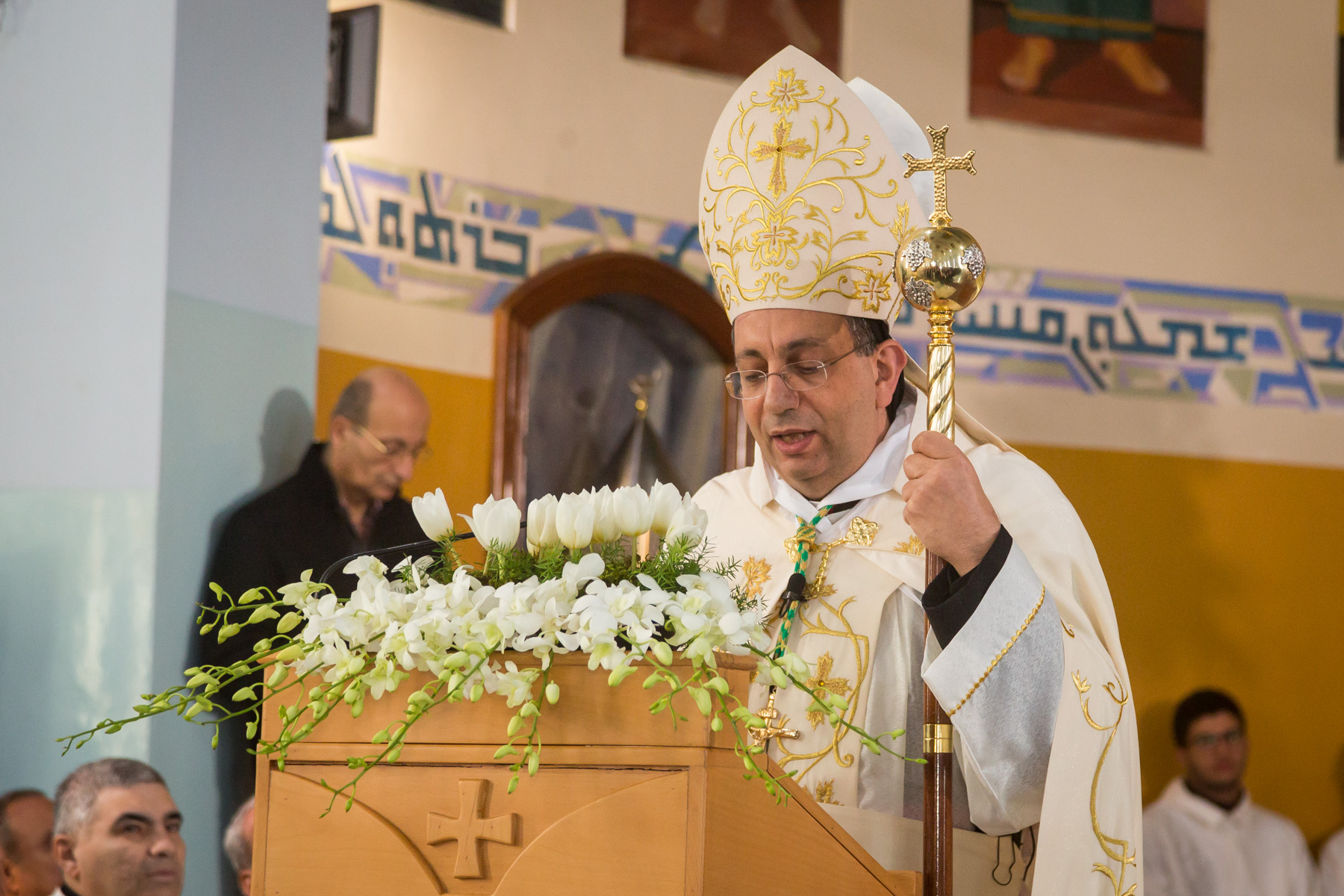
Bishop Naffah
After the Holy Gospel, Bishop Naffah gave the sermon, in which he said:
“His Beatitude and Eminence Patriarch Beshara Al Rahi has honored me by assigning me to represent him here today. I carry his salutations to you, and am delivering the sermon in his name.
“… Mother Mary did not think anymore about herself, her family or her fiancé. All her focus and dedication was to serve the project that God had entrusted her with, and help it to materialize. Every true believer should display the same readiness to serve, and to make sacrifices for the general good of others. Doing so would make every Christian a true Christian being granted Eternal Life.
“The best example of this kind of sacrifice was given to us by President René Moawad who dedicated his life to serve his country and his people, and was martyred on Lebanon’s Independence Day for this reason.
“President Moawad had the option of running the country in a submissive way while enjoying the power and glory of the highest position he was elected for and neglecting the general interests of the country. But he viewed the presidential position as a sacred responsibility equivalent to ‘carrying the cross’ of a nation engrossed in war. President Moawad actually mentioned this explicitly in his Presidential Oath speech addressing the Lebanese MPs and citizens, when he said: ‘I have made my oath to accept this responsibility towards my country and its people. No difficulties will hinder my efforts to move forward with the task of leading Lebanon towards safety. I make a promise that I will spare no efforts and will not rest until our new republic is established.’ Indeed, our hero and President did not rest, until the dark hands of treason stole him away from us to the eternal resting place of immortality.
He had started his inaugural address by saluting with honor the martyrs of Lebanon, as though he was aware of and ready too to offer the highest sacrifice, his life, for the sake of his country and his people. He said: ‘I bow down with humbleness in front of the great sacrifices of our martyrs, all our martyrs, from all the regions and political allegiances. I remember all of them today, and feel for the great loss in human lives that Lebanon has endured.’ You leaned over them, Mr. President, until you reached them and joined them… You did not spare yourself, and joined them in paying the same heavy price that they paid: offering your own life for the sake of our country. We, like all the Lebanese, still feel for the great loss of our martyrs. The loss is even bigger now, as you too have joined them: A unique president and a leader much loved not only by his partisans, but also by those that were on opposing sides.
“You were the man of peace and of agreement, continuously seeking what is of public interest. Everyone saw you as the embodiment of these qualities, and saw in you their leader and President. You yourself said this about your person in your famed inaugural speech: ‘I always was, and you knew me as such through my life and my path, the man of reconciliation and mediation, always working on building bridges between people, finding compromise solutions, and bringing people together. I always refused conflict and division. Today, I consider it as my life’s challenge to bring about reconciliation between all the Lebanese, from all parts of the country. National reconciliation doesn’t exclude anyone, even those who insist on excluding themselves. When reconciliation is achieved, it belongs to everyone and holds space for all.’
“With each starting day, we miss you and miss your comrades our martyrs and heroes, as we realize that our country hasn’t reached yet the dream and plans that you had for it. We miss you with each step achieved in the process of reestablishing national interests above any other interest. Wouldn’t it have been due justice and a necessary element that you yourself led these steps? You were the leading force to light the first sparkle initiating the path of moving our nation away from the dark predicament it was sinking in. We do believe though that from ‘up there’ you are continuing your work. You are actually still leading it ‘down here’ too, as real men mark their time on Earth not only through their deeds and achievements, but more so through the values, principles and vision that shine around them and reach the heart and conscience of those around them. They remain alive in the consciences, even after the person is physically no more. These values and living examples stay alive and remain strongly rooted, regardless of time. They became stronger in the hearts of all those who miss seeing you by their side, who remember you each time a new event happens that shows the rightness of your political views and your accurate evaluation of matters. Your only concern was preserving the country’s public interests.
“Your path and way, dear President and martyr, have always been honored by your wife Mrs. Nayla and your son Michel, and by all those who knew you and believed in your principles and your big project.
We miss you and are still pained by your absence. We miss you every day, but we are confident that the virtuous people of our country won’t let the light of your torch die away. We pray that very soon we would be able to make you proud of your country, for which you offered your life, as you look at us from up there. We pray that we be able to offer our children the future that you had promised us and that you dreamt of achieving. Lebanon deserves men like you; men that see political work as a sacred mission. A mission dedicated to service, and only to service…
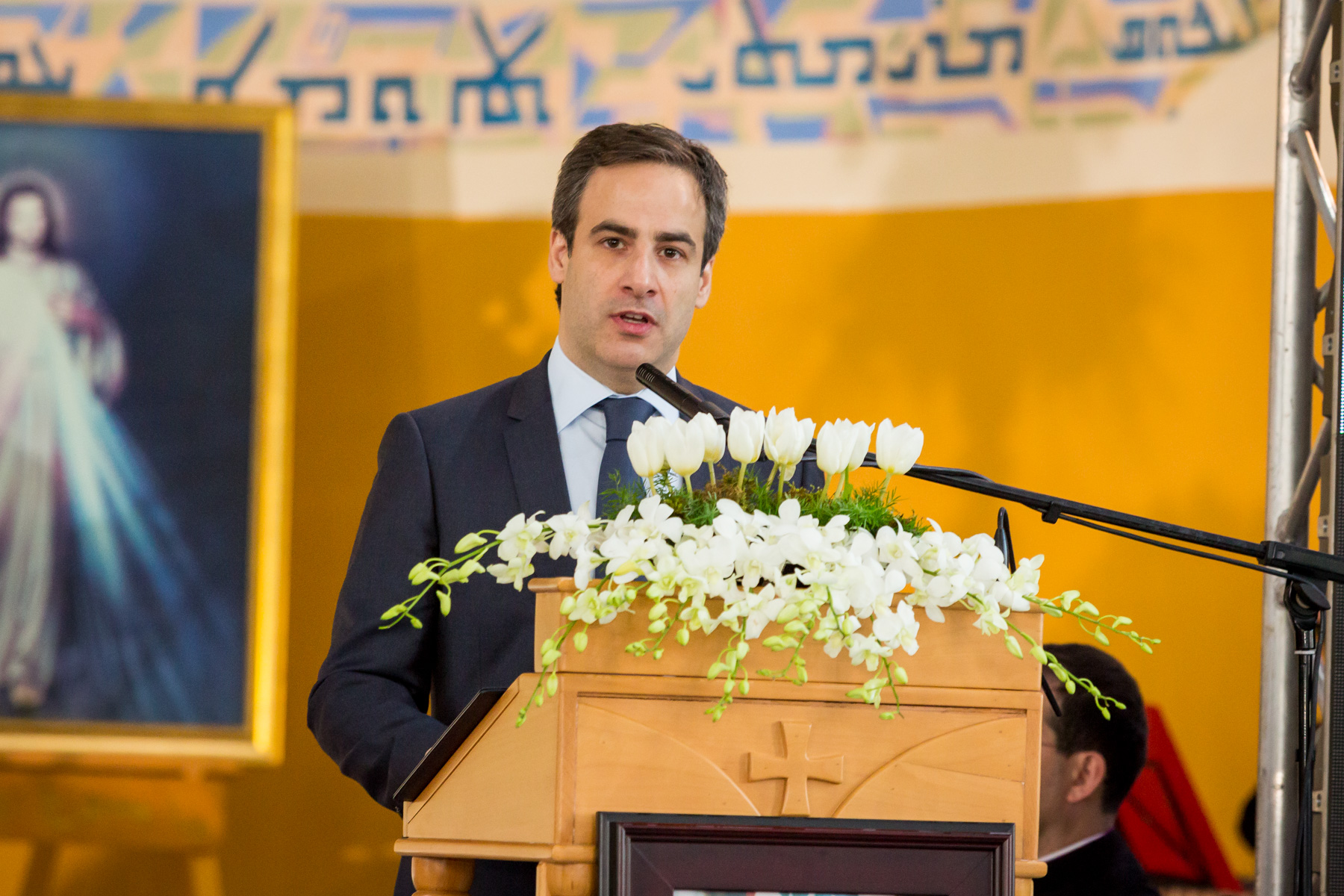
Moawad
The requiem mass was followed by a documentary summarizing President Moawad’s life and path, and highlighting the important events that focused on preserving Lebanon’s sovereignty, making the Lebanese Army the sole holder of arms on the territory, striving for national reconciliation, preserving Lebanon’s free decision making, and refusing any foreign interference.
The head of the Independence Movement Michel Moawad then gave a thanking address, in which he emphasized on the need for Lebanon to regain its free decision in order to reaffirm its national interests, protect its stability, and regain everyone’s trust. Moawad explained that stability necessitates first that everyone gathers again under the State’s umbrella, respects the political and constitutional institutions, and respects the country’s free parliamentary democratic regime. “There can be no stability”, he said, “outside the State’s umbrella, the Constitution, and the public institutions”. Moawad noted also that “stability necessitates dissociating Lebanon from the regional conflicts. This dissociation must be strictly and fully applied and for good. It would become a reality when we express support to all the common Arab causes, and refrain from interfering in the internal affairs of any foreign country, whether it is an Arab country or any other country in the world.”
In his address, Moawad criticized the numerous foreign interferences in Lebanon’s internal affairs. He said that “it was time that as a State and as Lebanese citizens from various political allegiances, we think of Lebanon’s interests above anything else.” “Lebanon’s interest”, he said, “is to have a strong and effective State, not a crippled one; a State that holds the exclusivity on arms, and collects the arms from the various groups with no exceptions, like the Taëf Accord states. Any arms outside the State’s sole control drags us into regional power games, which leads to disastrous consequences like what we are witnessing today.”
He added: “As a founding member of the UN and of the Arab League, Lebanon’s interest is to respect international resolutions and the Arab League resolutions. The personal and economic interests of all the Lebanese nationals living and working in Arab countries and around the World, depend deeply on the Lebanese State’s relations with these countries.”
He also said that even 28 years after President René Moawad’s martyrdom, the psychological divisions between the Lebanese are still present. “The reason for this”, he explained, “is that not all the parties have gone back under the State’s umbrella, with some groups still having their own projects outside the State’s legitimacy, and even outside the country’s borders.”
The enclosure outside the church was fully packed with President Moawad’s partisans who could not find seats inside the church. For the occasion, the streets of Zgharta were filled with posters of President Moawad and his martyred companions, and banners displaying quotes from his speeches.
After the mass, Mrs Nayla Moawad, Michel René Moawad and the families of martyrs, received condolences from the Papal Chargé d’Affaires in Lebanon Msgr. Yvan Santos and the various bishops, priests and monks present. Prior to the Mass, at the Moawad family residence, they had received the same from mayors, mukhtars, dignitaries, representatives of various instances, and the people of Zgharta-Al Zawiyat.
To read Michel Moawad’s full speech
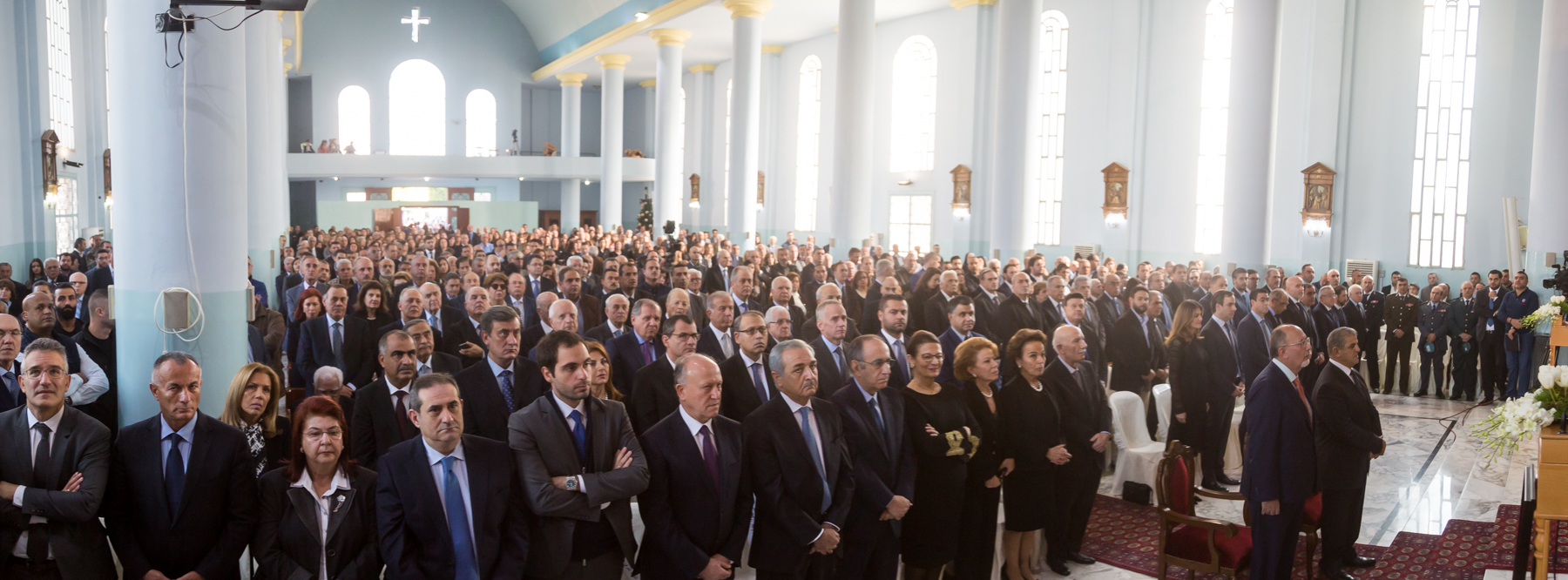
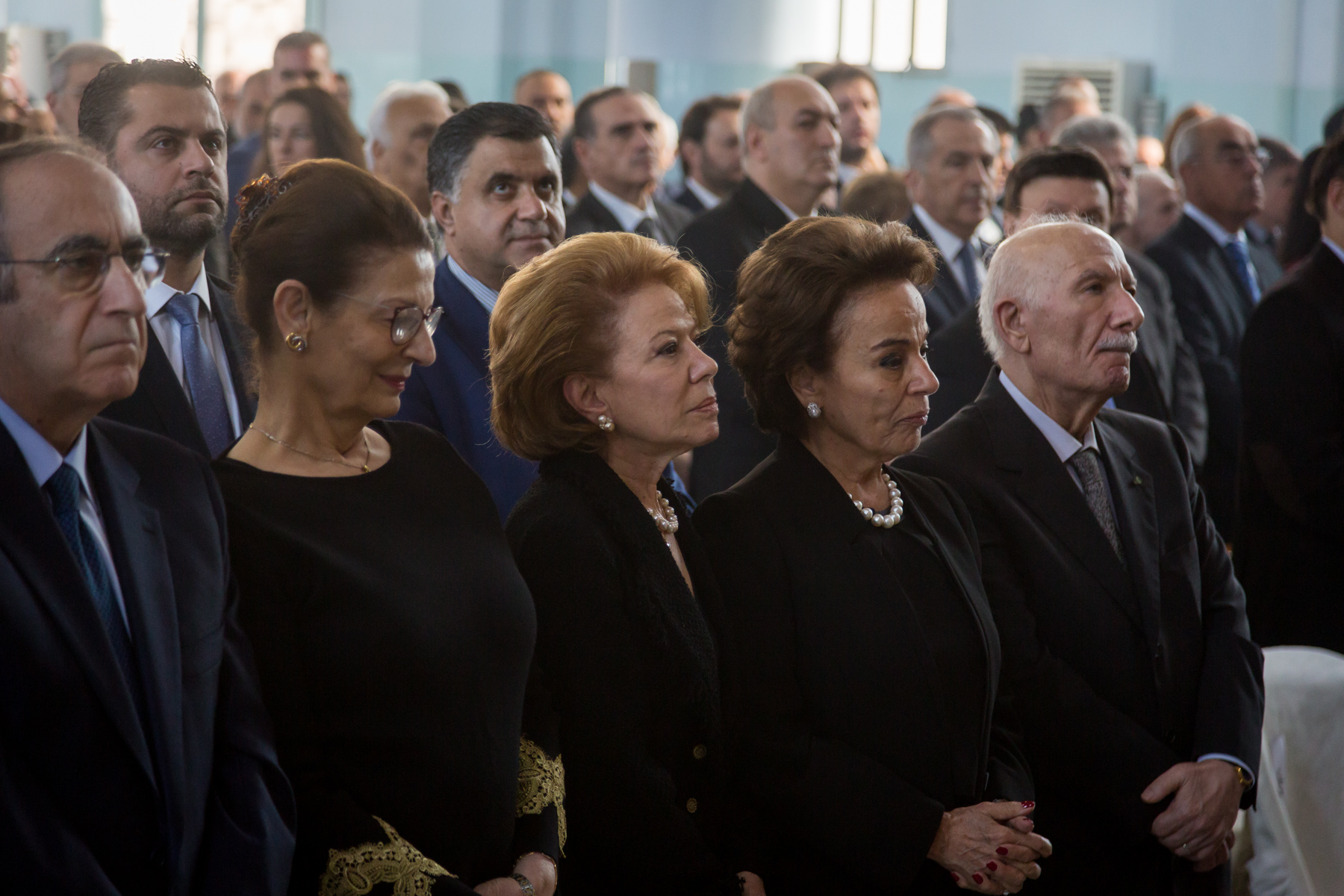
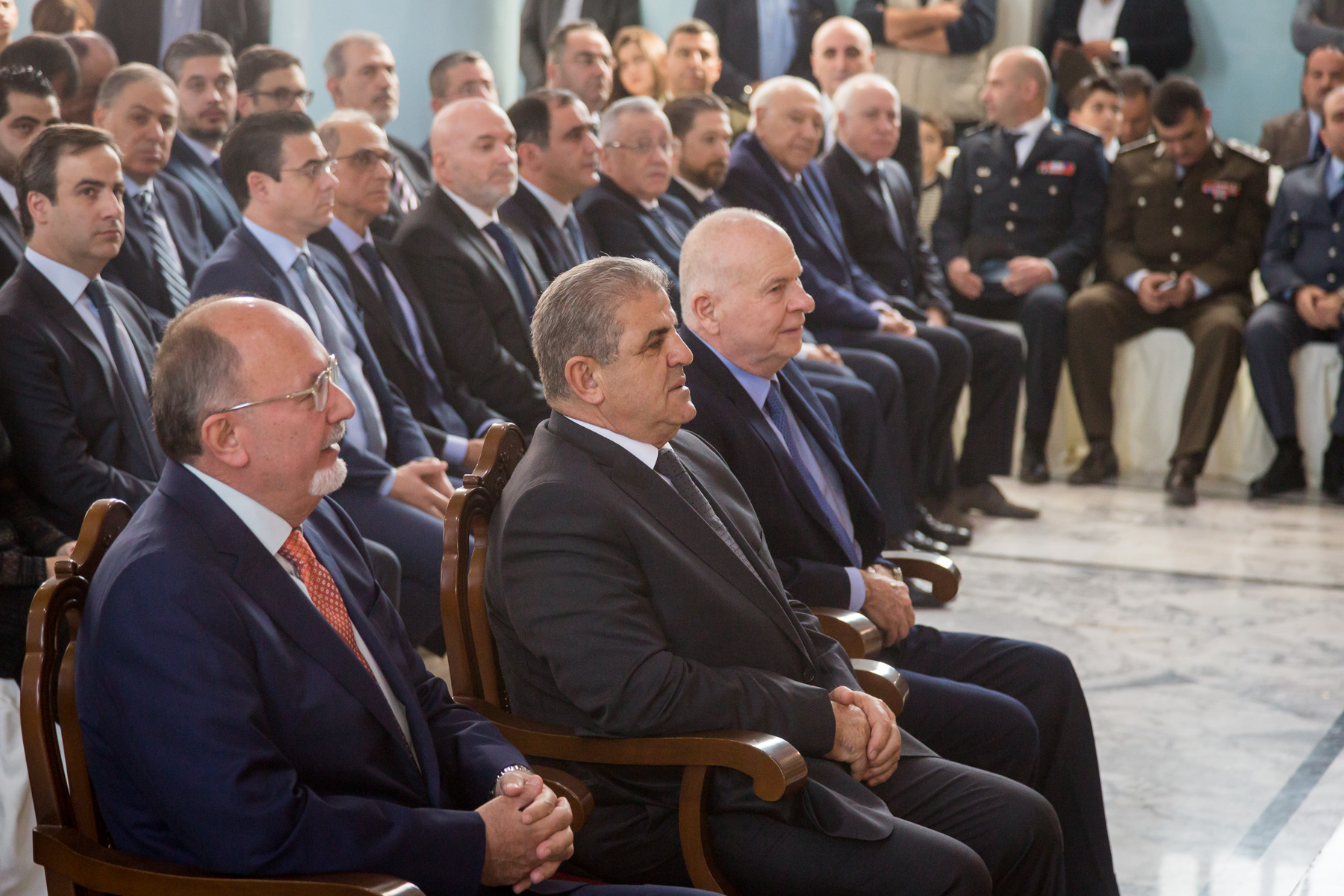






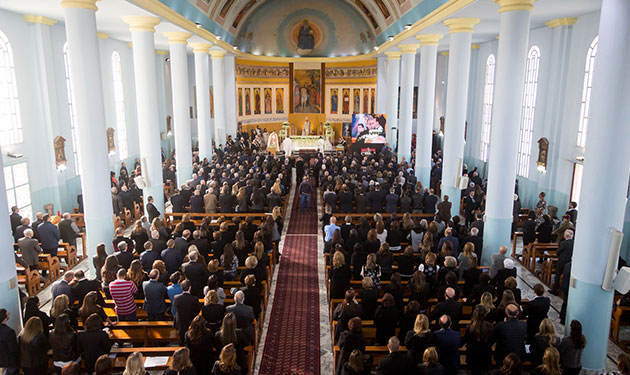
 العربية
العربية